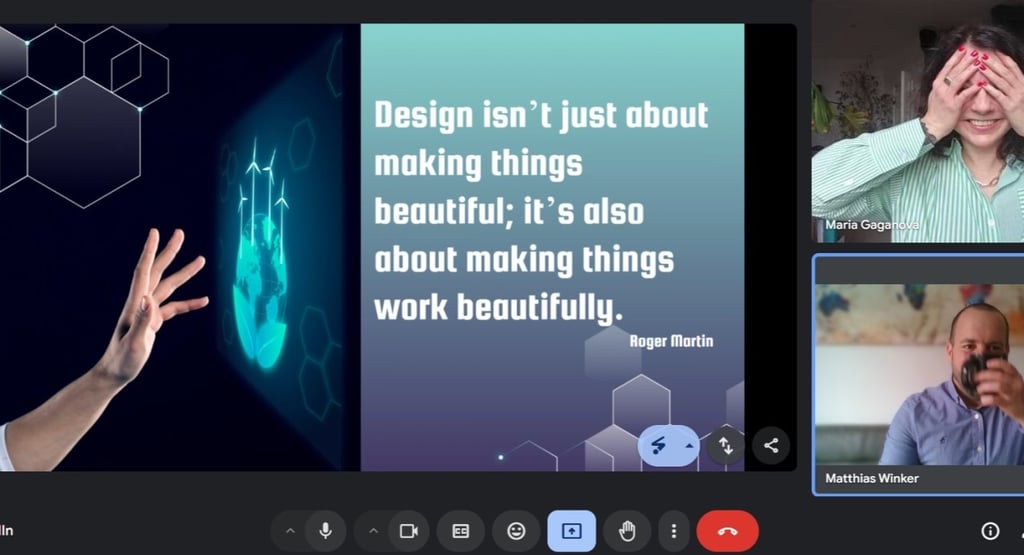Business models and must-have processes for successful health innovators


We did it! The first webinar for innovators, start-ups, and scale-ups in the medical device, healthtech, and pharma sectors hosted by Maria Gaganova and Matthias Winker. And like any good innovation journey, it wasn’t without its challenges. Technical glitches tested our agility, but we adapted, pivoted, and delivered an insightful session packed with value.
If you missed it (or want a recap), here’s a breakdown of the key insights we shared.
Building a business model that works in healthcare
We started with a fundamental question: What exactly is a business model? At its core, a business model defines how you create, deliver, and capture value. But in healthcare, answering these questions is anything but straightforward:
Who are you helping? Patients, Clinicians, NHS trusts, Integrated Care Systems, private insurers?
How are you delivering your solution? Direct-to-patient, NHS partnerships, digital platforms?
How do you make money? NHS procurement, reimbursement, grants, private contracts?
The NHS presents massive opportunities due to its scale, but navigating its complexities requires a razor-sharp business strategy. A clear, well-structured business model is your North Star.
To simplify this, we introduced Alex Osterwalder’s Business Model Canvas—a powerful tool that breaks your strategy into nine key areas.
Here’s what we covered:
1. Value Proposition
What problem are you solving, and why does it matter to the NHS?
How does your innovation improve patient outcomes, efficiency, or reduce costs?
Does your solution align with NHS priorities? Think about the three big shifts (e.g., prevention over treatment, digital-first approaches, from hospital to community)?
2. Customer Segments
Who are your users, and what pain points do you solve?
Who makes the purchasing decisions? (Hint: It’s rarely the end user!)
Who influences NHS buying decisions (e.g. clinicians, IT officers, procurement teams)?
3. Channels
How will you sell and deliver your solution?
NHS procurement is complex and time-consuming; are you ready?
Key routes: NHS Supply Chain, direct NHS contracts, private partnerships
4. Customer Relationships
Trust is everything in healthcare. How will you build it?
Do you have clinical validation, testimonials, regulatory approvals?
What ongoing support will you provide to customers?
5. Revenue Streams
How do you get paid within the NHS?
Common models: NHS contracts, reimbursement schemes, private healthcare partnerships.
How will you ensure sustainable revenue growth?
6. Key Resources
What do you need to succeed (talent, tech, clinical validation, regulatory expertise, relationships)?
7. Key Activities
Critical tasks: R&D, clinical trials, regulatory approvals, market entry strategy, implementation.
8. Key Partnerships
NHS adoption often requires strong partnerships. Who are yours?
9. Cost Structure
With long NHS sales cycles, how will you manage cash flow?
Where will your biggest costs be? (R&D, regulatory approvals, sales?)
A well-structured business model is your roadmap to success. It helps you navigate NHS complexities, define your market strategy, and build a scalable, sustainable business.
Business model canvas is not something you do once. It can change together with your business and serve as a tool to evaluate new ideas.
Tip: Fill in the Canvas and present your product going from quadrant 1 to 9! If you can clearly explain how you deliver value proposition to your customers, what are the ways to bring revenue are and how your costs are structured. This may be a great start to your pitch!
The hidden growth lever: Internal processes
For many start-ups, internal processes aren’t top of mind. But here’s the reality—they can make or break your ability to scale.
Big companies have Standard Operating Procedures (SOPs) for how to write SOPs (seriously!), but start-ups don’t need that level of bureaucracy. The challenge is figuring out which processes are critical from day one and which can wait.
In the second part of our webinar, we ran an interactive session, asking the audience to decide: Must-have or Nice-to-have?
Here’s what we landed on:
Regulatory and compliance (incl. Data governance): If you don’t get regulatory and compliance right, nothing else matters for NHS adoption.
Clinical validation and evidence generation: Data beats opinions. Invest in validation early.
Marketing strategy and branding: In NHS sales, trust matters more than branding
Customer onboarding and implementation process: Winning the contract is only half the battle. Implementation is where success happens.
HR processes: Hire well, keep it simple, and add structure as you grow
Customer support and success process: Early-stage? Keep it lean. Scaling? Build a structured support process.
Reimbursement and funding strategy: A great product without a revenue strategy = a failing business.
Partnership and stakeholder engagement process: In healthcare, partnerships open doors. Start building them early.
Bottom line? Your internal processes should evolve as you scale. The right foundations will set you up for long-term success.
Final thoughts
If there’s one thing to remember from our webinar, it’s this: Innovation alone isn’t enough.
The most successful healthcare companies don’t just have ground-breaking ideas. They understand the NHS landscape, build robust business models, and develop internal processes that support growth.
What’s next?
Take a step back—where are the gaps in your business model?
Prioritise the must-have internal processes to scale efficiently.
Build relationships with NHS buyers, clinicians, and health innovation networks. Healthcare is a people-driven industry, and partnerships are your biggest advantage.
The NHS is a huge opportunity, but it requires patience, persistence, and strategic execution. The good news? You don’t have to navigate it alone.
Tap into the networks, funding opportunities, and expert support available to UK health innovators. And most importantly, keep your eyes on the bigger picture. This isn’t just about building a successful company; it’s about improving lives, transforming healthcare, and driving real change.
We’d love to hear from you! What’s been your biggest challenge in navigating the NHS? Drop a comment below or reach out to Maria Gaganova or Matthias Winker. We’re here to help.
First published on LinkedIn
